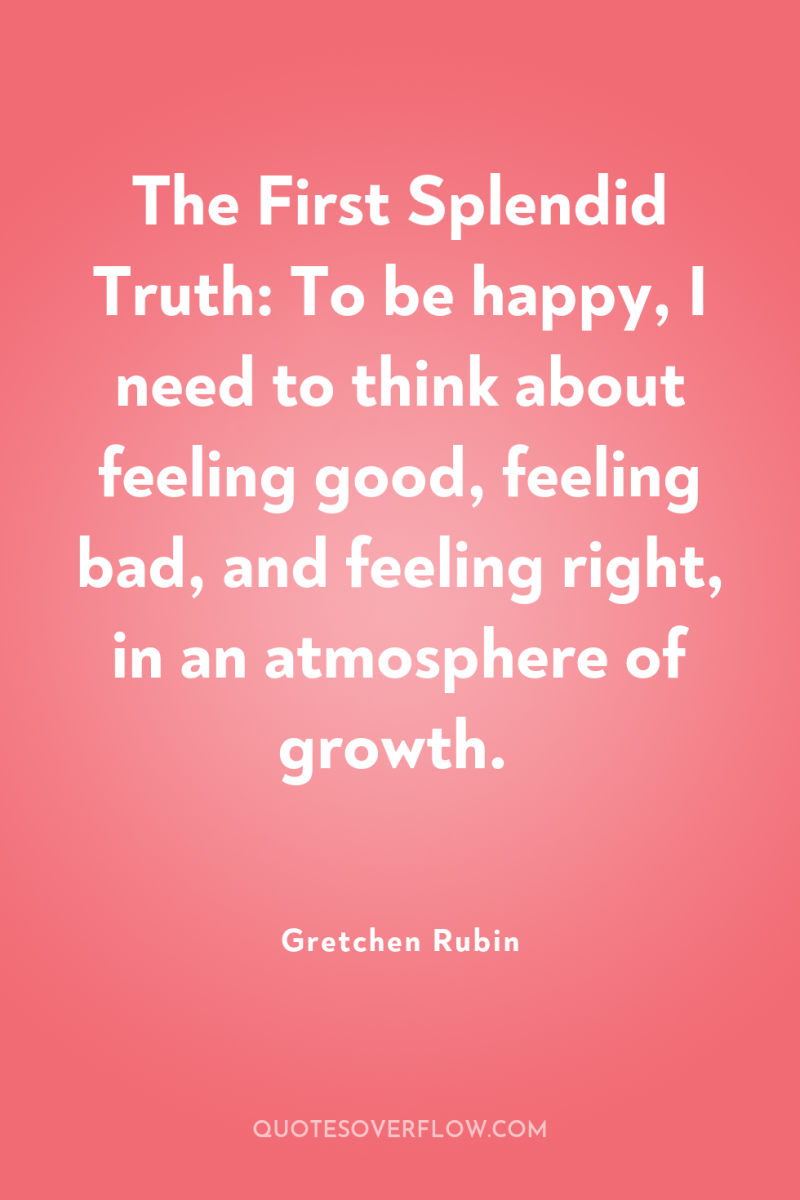
1
The First Splendid Truth: To be happy, I need to think about feeling good, feeling bad, and feeling right, in an atmosphere of growth.Gretchen Rubin
2
... one flaw throws the loveliness of [everything else] into focus. I remember reading that Shakers deliberately introduced a mistake into the things they made, to show that man shouldn't aspire to the perfection of God. Flawed can be more perfect than perfection.Gretchen Rubin
3
The belief that unhappiness is selfless and happiness is selfish is misguided. It's more selfless to act happy. It takes energy, generosity, and discipline to be unfailingly lighthearted, yet everyone takes the happy person for granted. No one is careful of his feelings or tries to keep his spirits high. He seems self-sufficient; he becomes a cushion for others. And because happiness seems unforced, that person usually gets no credit.Gretchen Rubin
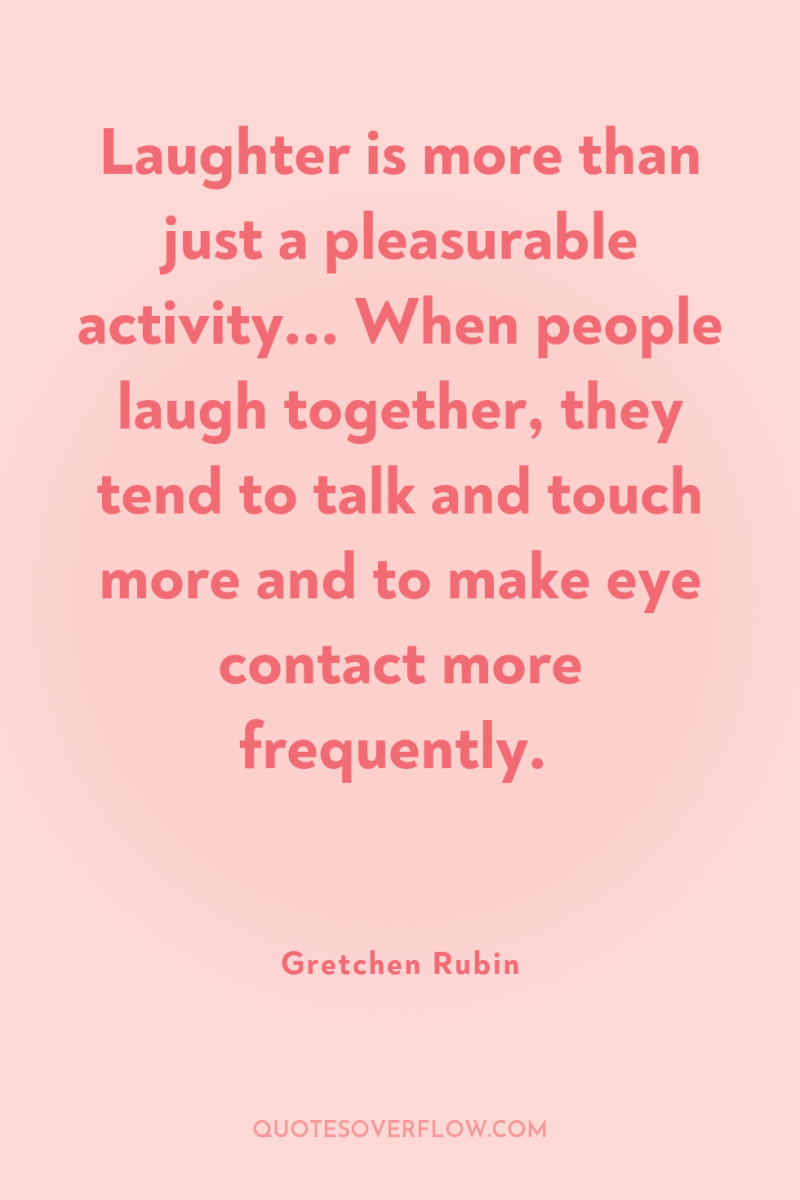
4
Laughter is more than just a pleasurable activity... When people laugh together, they tend to talk and touch more and to make eye contact more frequently.Gretchen Rubin
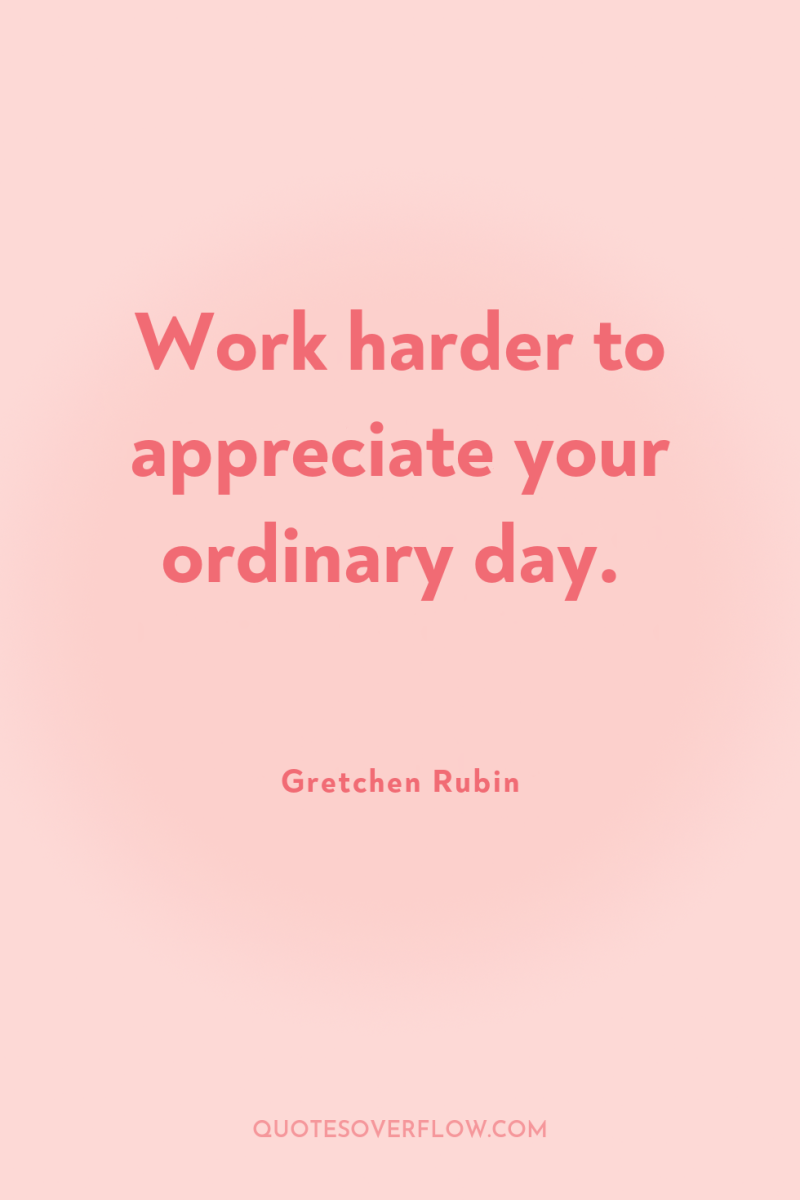
5
Work harder to appreciate your ordinary day.Gretchen Rubin
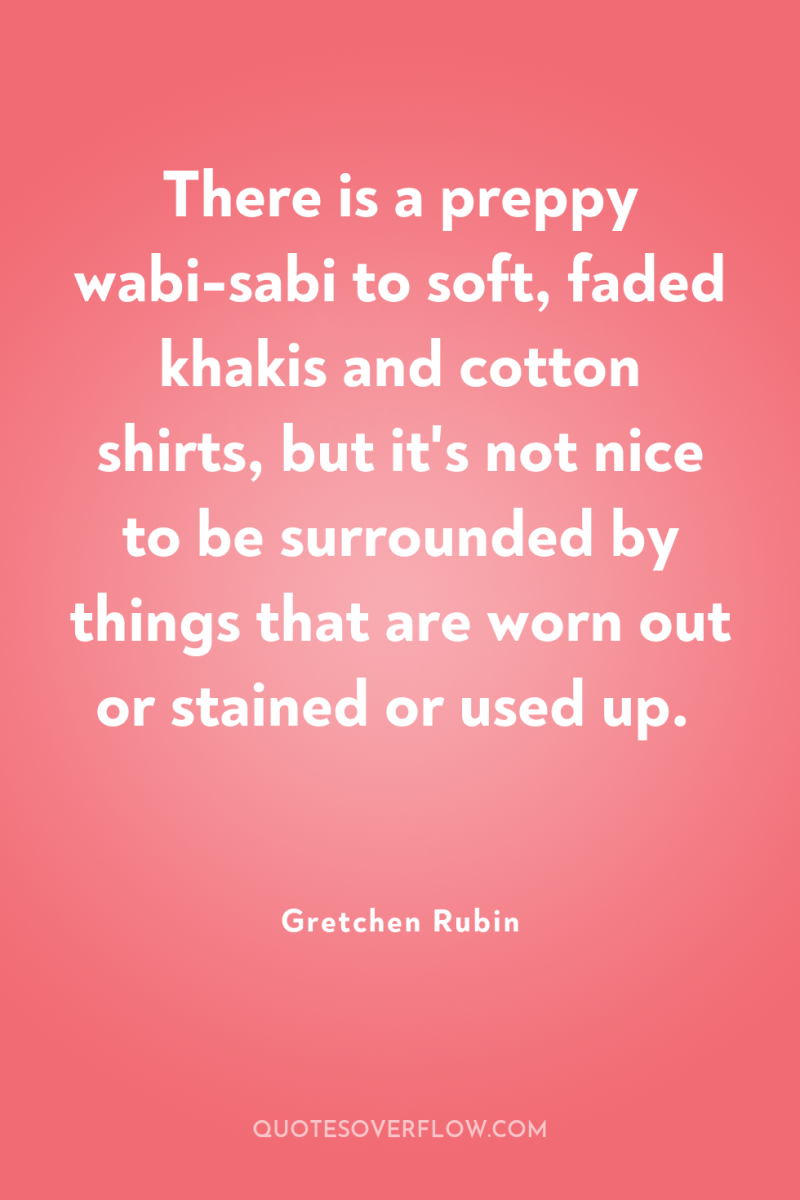
6
There is a preppy wabi-sabi to soft, faded khakis and cotton shirts, but it's not nice to be surrounded by things that are worn out or stained or used up.Gretchen Rubin
7
Sometimes I succeed, sometimes I fail, but everyday is a clean state and a fresh opportunity.Gretchen Rubin
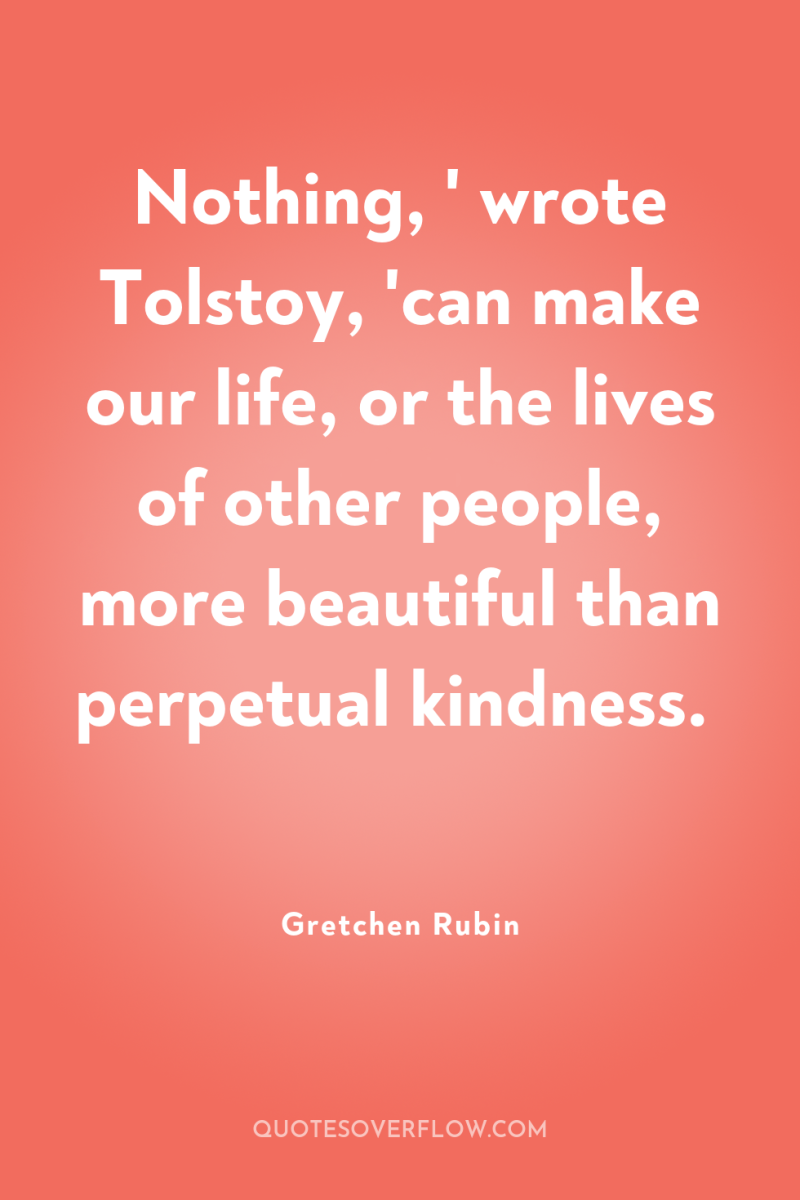
8
Nothing, ' wrote Tolstoy, 'can make our life, or the lives of other people, more beautiful than perpetual kindness.Gretchen Rubin
9
Accept myself, and expect more of myself. Give myself limits to give myself freedom. Make people happier by acknowledging that they’re not feeling happy. Plan ahead to be spontaneous; only with careful preparation do I feel carefree. Accomplish more by working less. Happiness doesn’t always make me feel happy. Flawed can be more perfect than perfection. It’s very hard to make things easier. My material desires have a spiritual aspect. Hell is other people. Heaven is other people. What was “happiness, ” anyway, and was it even possible to make myself happier? .Gretchen Rubin
10
Once I started trying to give positive reviews, though, I began to understand how much happiness I took from the joyous ones in my life---and how much effort it must take for them to be consistently good=tempered and positive. It is easy to be heavy; hard to be light. We nonjoyous types suck energy and cheer from the joyous ones; we rely on them to buoy us with their good spirit and to cushion our agitation and anxiety. At the same time, because of a dark element in human nature, we're sometimes provoked to try to shake the enthusiastic, cheery folk out of their fog of illusion---to make them see that the play was stupid, the money was wasted, the meeting was pointless. Instead of shielding their joy, we blast it.Gretchen Rubin
11
I often learn more from one person's highly idiosyncratic experiences than I do from sources that detail universal practices or cite up-to-date studies.Gretchen Rubin
12
Never start a sentence with the words 'No offense.Gretchen Rubin
13
I should pursue only those habits that would make me feel freer and stronger.Gretchen Rubin
14
When I thought about why I was sometimes reluctant to push myself, I realized that it was because I was afraid of failure - but in order to have more success, I needed to be willing to accept more failure.Gretchen Rubin
15
I enjoy the fun of failure. It's fun to fail, I kept repeating. It's part of being ambitious; it's part of being creative. If something is worth doing, it's worth doing badlyGretchen Rubin
16
I'd always vaguely expected to outgrown my limitations.Gretchen Rubin
17
Studies show that aggressively expressing anger doesn't relieve anger but amplifies it. On the other hand, not expressing anger often allows it to disappear without leaving ugly traces.Gretchen Rubin
18
Although we presume that we act because of the way we feel, in fact we often feel because of the way we act.Gretchen Rubin
19
Say “no” only when it really matters. Wear a bright red shirt with bright orange shorts? Sure. Put water in the toy tea set? Okay. Sleep with your head at the foot of the bed? Fine. Samuel Johnson said, “All severity that does not tend to increase good, or prevent evil, is idle.Gretchen Rubin
20
Volunteering to help others is the right thing to do, and it also boosts personal happiness; a review of research by the Corporation for National and Community Service shows that those who aid the causes they value tend to be happier and in better health. They show fewer signs of physical and mental aging. And it's not just that helpful people also tend to be healthier and happier; helping others causes happiness. "Be selfless, if only for selfish reasons, " as one of my happiness paradoxes holds. About one-quarter of Americans volunteer, and of those, a third volunteer for more than a hundred hours each year.Gretchen Rubin
21
Experts say that denying bad feelings intensifies them, acknowledging bad feelings allows good feelings to return.Gretchen Rubin
22
By mindfully deciding how to act in line with my values instead of mindlessly applying my rules, I was better able to make the decisions that supported my happiness.Gretchen Rubin
23
This is one of the many paradoxes of happiness: we seek to control our lives, but the unfamiliar and the unexpected are important sources of happiness.Gretchen Rubin
24
I think adversity magnifies behavior. Tend to be a control freak? You'll become more controlling. Eat for comfort? You'll eat more. And on the positive, if you tend to focus on solutions and celebrate small successes, that's what you'll do in adversity.Gretchen Rubin
25
I always had the uncomfortable feeling that if I wasn't sitting in front of a computer typing, I was wasting my time--but I pushed myself to take a wider view of what was "productive." Time spend with my family and friends was never wasted.Gretchen Rubin
26
What's fun for other people may not be fun for you- and vice versa.Gretchen Rubin
27
When possible, the brain makes a behavior into a habit, which saves effort and therefore gives us more capacity to deal with complex, novel, or urgent matters.Gretchen Rubin
28
Upholders may struggle in situations where expectations aren't clear or the rules aren't established. They may feel compelled to meet expectations, even ones that seem pointless. They may feel uneasy when they know they're breaking the rules, even unnecessary rules, unless they work out a powerful justification to do so.Gretchen Rubin
29
Audiences = expectations. If he thinks you're not watching, he won't need to rebel against your expectations.Gretchen Rubin
30
I had everything I could possibly want -- yet I was failing to appreciate it. Bogged down in petty complaints and passing crises, weary of struggling with my own nature, I too often failed to comprehend the splendor of what I had.Gretchen Rubin
31
'Potato-chip news' is news that's repetitive, requires little effort to absorb, and is consumable in massive quantities: true crime, natural disasters, political punditry, celebrity gossip, sports gossip, or endless photographs of beautiful houses, food, or clothes.Gretchen Rubin
32
Nature is impersonal, awe-inspiring, elegant, eternal. It's geometrically perfect. It's tiny and gigantic. You can travel far to be in a beautiful natural setting, or you can observe it in your backyard - or, in my case, in the trees lining New York City sidewalks, or in the clouds above skyscrapers.Gretchen Rubin
33
Growing up in Kansas City, I was always neat, the teacher's pet, know-it-all type.Gretchen Rubin
34
They say that people teach what they need to learn. By adopting the role of happiness teacher, if only for myself, I was trying to find the method to conquer my particular faults and limitations.Gretchen Rubin
35
In the scope of a happy life, a messy desk or an overstuffed coat closet is a trivial thing, yet I find - and I hear from other people that they agree - that getting rid of clutter gives a disproportionate boost to happiness.Gretchen Rubin
36
If I can do something in less than one minute, I don't let myself procrastinate. I hang up my coat, put newspapers in the recycling, scan and toss a letter. Ever since I wrote about this rule in 'The Happiness Project, ' I've been amazed by how many people have told me that it has made a huge difference in their lives.Gretchen Rubin
37
Each week, I post a video about some 'Pigeon of Discontent' raised by a reader. Because, as much as we try to find the 'Bluebird of Happiness, ' we're also plagued by those small but pesky 'Pigeons of Discontent.'Gretchen Rubin
38
Happiness is a critical factor for work, and work is a critical factor for happiness. In one of those life-isn't-fair results, it turns out that the happy outperform the less happy. Happy people work more hours each week - and they work more in their free time, too.Gretchen Rubin
39
We need to have intimate, enduring bonds; we need to be able to confide; we need to feel that we belong; we need to be able to get support, and just as important for happiness, to give support. We need many kinds of relationships; for one thing, we need friends.Gretchen Rubin
40
As goofy as it sounds, I try to sing in the morning. It's hard both to sing and to maintain a grouchy mood, and it sets a happy tone for everyone - particularly in my case, because I'm tone deaf, and my audience finds my singing a source of great hilarity.Gretchen Rubin
41
It was my interest in happiness that led me to the subject of habits, and of course, the study of habits is really the study of happiness. Habits are the invisible architecture of everyday life, and a significant element of happiness.Gretchen Rubin
42
One of the best ways to make yourself happy in the present is to recall happy times from the past. Photos are a great memory-prompt, and because we tend to take photos of happy occasions, they weight our memories to the good.Gretchen Rubin
43
We can use decision-making to choose the habits we want to form, use willpower to get the habit started, then - and this is the best part - we can allow the extraordinary power of habit to take over. At that point, we're free from the need to decide and the need to use willpower.Gretchen Rubin
44
Turn off your email; turn off your phone; disconnect from the Internet; figure out a way to set limits so you can concentrate when you need to, and disengage when you need to. Technology is a good servant but a bad master.Gretchen Rubin
45
Like most people, I have several pet subjects - that may or may not be interesting to other people. Don't get me started on happiness, or habits, or children's literature, or Winston Churchill, unless you really want to talk about it.Gretchen Rubin
46
Enthusiasm is a form of social courage.Gretchen Rubin
47
Work done by other people sounds easy. How hard can it be to take care of a newborn who sleeps 20 hours a day? How hard can it be to keep track of your billable hours? To travel for one night for business? To get a 4-year-old ready for school? To return a few phone calls? To load the dishwasher? To fill out some forms?Gretchen Rubin
48
One of my key realizations about happiness, and a point oddly under-emphasized by positive psychologists, given its emphasis in popular culture, is that outer order contributes to inner calm. More than it should.Gretchen Rubin
49
Skillful conversationalists can explore disagreements and make points in ways that feel constructive and positive rather than combative or corrective.Gretchen Rubin
50
People are powerfully moved by imagination, belief, and knowledge. They can consider the past and future. They can make changes in their behavior out of reason in a way that animals can't do.Gretchen Rubin
51
Whenever I start a new book, I think, 'This is the most interesting subject of all time. It's sad, I'll never enjoy writing another book as much as I enjoy this one.' Every time, I'm convinced. And then I change my mind when I start the next book.Gretchen Rubin
52
Negative emotions like loneliness, envy, and guilt have an important role to play in a happy life; they're big, flashing signs that something needs to change.Gretchen Rubin